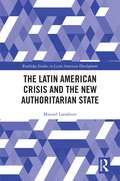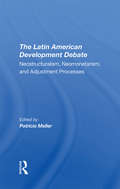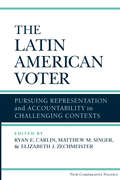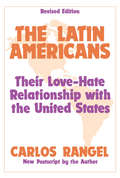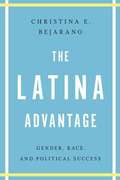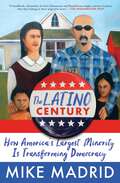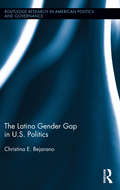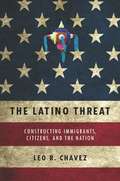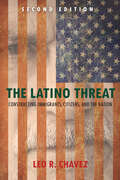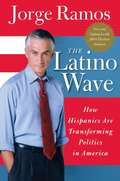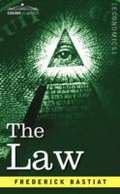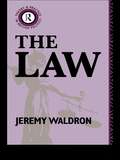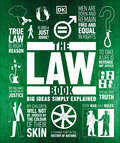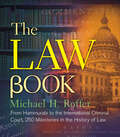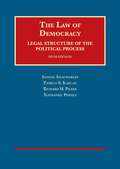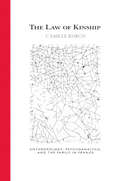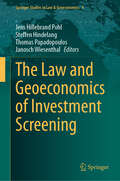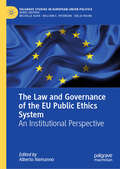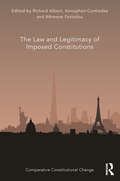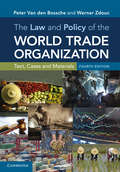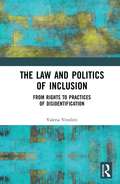- Table View
- List View
The Latin American Crisis and the New Authoritarian State (Routledge Studies in Latin American Development)
by Manuel LarrabureThis book provides a fresh interpretation of the rise and fall of Latin America’s ‘left turn’, or movement towards more progressive economic or social policies. From a historical and comparative perspective, the book argues that Latin America is entering a new phase of authoritarian statism. Based on over 10 years of research on Latin American political economy and social movements, including years of fieldwork in Chile, Brazil, Venezuela and Argentina, this book combines the stories of individuals and groups in particular situations with the macro-level political and economic trajectory of the region since the postwar period. The book draws on over 100 interviews with community activists, workers, union leaders, politicians, journalists, and NGOs, as well as archival work. In addition, the book uses up-to-date national and regional economic data, including both standard and heterodox development indicators. By engaging with key case studies including Argentina’s recovered enterprises, Chile’s student movement, Brazil’s free transit movement, and Venezuela’s popular economy, this book analyzes the complex relationship between "post-capitalist struggles" and the governance models of the "pink tide", the wave of left governments that began to sweep the region at the turn of the century. This book will be of interest to researchers across politics, development, Latin American studies and social movement studies. The original data and analysis of the relationship between social movements and governments will also benefit policymakers and those working within the NGO sector.
The Latin American Development Debate: Neostructuralism, Neomonetarism, And Adjustment Processes
by Patricio MellerIn the 1980s Latin America experienced its second worst economic crisis of the century; today the average per capita income is about 10 percent less than a decade ago. Because the crisis affected all Latin American countries regardless of their economic policies, the period has become known as "the lost decade in Latin America." In this book, eminent economists from the region reexamine strategies of development—structuralism versus monetarism, liberalism versus statism, growth versus equity—in light of new theoretical knowledge and recent economic events. The essays offer a complex interpretation of development problems and seek to explain how different schools of thought could be compatible and how old debates must be recast in the light of structural changes in Latin American economies. In addition, contributors critically review the adjustment processes applied in various countries. Together the chapters offer a penetrating analysis of what went wrong in Latin America in the 1980s and a careful assessment of economic measures and policies that might prove viable in promoting stable and growing economies, democratic regimes, and social justice.
The Latin American Voter: Pursuing Representation And Accountability In Challenging Contexts
by Ryan E. Carlin Matthew M. Singer Elizabeth J. ZechmeisterIn this volume, experts on Latin American public opinion and political behavior employ region-wide public opinion studies, elite surveys, experiments, and advanced statistical methods to reach several key conclusions about voting behavior in the region's emerging democracies. In Latin America, to varying degrees the average voter grounds his or her decision in factors identified in classic models of voter choice. Individuals are motivated to go to the polls and select elected officials on the basis of class, religion, gender, ethnicity and other demographic factors; substantive political connections including partisanship, left-right stances, and policy preferences; and politician performance in areas like the economy, corruption, and crime. Yet evidence from Latin America shows that the determinants of voter choice cannot be properly understood without reference to context--the substance (specific cleavages, campaigns, performance) and the structure (fragmentation and polarization) that characterize the political environment. Voting behavior reflects the relative youth and fluidity of the region's party systems, as parties emerge and splinter to a far greater degree than in long-standing party systems. Consequently, explanations of voter choice centered around country differences stand on equal footing to explanations focused on individual-level factors.
The Latin Americans: Their Love-hate Relationship with the United States
by Carlos RangelThis is a provocative work that runs counter to the conventional wisdom that the poor are poor because the rich are rich. Rangel argues that the reasons for different levels of economic development between North America and Latin America lie in the two continents' divergent history of colonization, the differences between their dominating social structures, and the contrary ethical precepts of Catholicism and Protestantism. Last, but by no means least, there are two all-pervasive myths: in the past, that of the noble savage, in the present, that of the good revolutionary.
The Latina Advantage: Gender, Race, and Political Success
by Christina E. BejaranoDuring the past decade, racial/ethnic minority women have made significant strides in U. S. politics, comprising large portions of their respective minority delegations both in Congress and in state legislatures. This trend has been particularly evident in the growing political presence of Latinas, yet scholars have offered no clear explanations for this electoral phenomenon--until now. In The Latina Advantage, Christina E. Bejarano draws on national public opinion datasets and a close examination of state legislative candidates in Texas and California to demonstrate the new power of the political intersection between race and gender. Underscoring the fact that racial/ethnic minority women form a greater share of minority representatives than do white women among white elected officials, Bejarano provides empirical evidence to substantiate previous theoretical predictions of the strategic advantage in the intersectionality of gender and ethnicity in Latinas. Her evidence indicates that two factors provide the basis for the advantage: increasingly qualified candidates and the softening of perceived racial threat, leading minority female candidates to encounter fewer disadvantages than their male counterparts. Overturning the findings of classic literature that reinforce stereotypes and describe minority female political candidates as being at a compounded electoral disadvantage, Bejarano brings a crucial new perspective to dialogues about the rapidly shifting face of America's electorate.
The Latino Century: How America's Largest Minority Is Transforming Democracy
by Mike MadridAn insightful investigation of how and why the two major political parties have failed to appeal to the Latino vote—the largest ethnic voting group in the country—and the impact it will have on American democracy and politics for decades to come.In 2020, Latinos became the second largest ethnic voting group in the country. They make up the largest plurality of residents in the most populous states in the union, as well as the fastest segment of the most important swing states in the US Electoral College. Fitting neither the stereotype of the aggrieved minority voter nor the traditional assimilating immigrant group, Latinos are challenging both political parties' notions of race, religious beliefs, economic success, and the American dream. Given their exploding numbers—and their growing ability to determine the fate of local, state, and national elections—you&’d think the two major political parties would understand Latino voters. After all, their emergence on the national scene is not a new phenomenon. But they still don&’t. Republicans, not because of their best efforts but rather despite them, are just beginning to see a movement of Latinos toward the GOP. Democrats, for the moment, still win a commanding share of the Latino vote, but that share is dwindling fast. Now, in The Latino Century, veteran political consultant Mike Madrid uses thirty years of research and campaign experience at some of the highest levels on both sides of the aisle to address what might be the most critical questions of our time: Will the rise of Latino voters continue to foment the hyper-partisan and explosive tribalism of our age or will they usher in a new pluralism that advances the arc of social progress? How and why are both political parties so uniquely unprepared for the coming wave of Latino votes? And what must each party do to win those votes? By answering these questions, The Latino Century explores the true meaning of America at a time of rapid cultural change, the founding principles of self-government and individual responsibility, and one man&’s journey through a political party that has turned itself inside out.
The Latino Gender Gap in U.S. Politics (Routledge Research in American Politics and Governance)
by Christina E. BejaranoMany questions remain unanswered about the observable differences in voting behavior, partisanship, and cultural attitudes among men and women. Latino political participation in the United States is generally lower than the rest of the population, mainly due to their high proportion of youth and foreign born populations that are ineligible to vote. This dynamic is slowing changing, partly as a result of the rapidly growing Latino population in the United States. This book delves deeper into the complex gender differences for Latino political behavior. More specifically, it is a political analysis of the diverse U.S. Latino population and the interacting factors that can influence male and female differences in voting and policy attitudes. Christina E. Bejarano carefully unpacks more aspects of the gender category for Latinos, including analyzing the gender differences in Latino political behavior across national origin, foreign born status, and generational status. The Latino gender gap can have far-reaching political implications on electoral politics. As the Latino population highlights their growing political sway, the major political parties have and will strategically mobilize and court the Latino electorate, Latinas in particular.
The Latino Threat: Constructing Immigrants, Citizens, and the Nation
by Leo ChavezThe April 2005 Minuteman Project, in which vigilantes from the US patrolled the border with Mexico, and the mass rallies of Latinos in many US cities during the spring of 2006, says Chavez (anthropology, U. of California-Irvine), were both elements in an ongoing debate about immigration, the meaning of citizenship, and the power of media spectacles. He discovers a narrative that Latinos, unlike previous immigrants, are unwilling or incapable of integrating into US life, and are devoted to reconquering the southwest of the country that was stolen from them and destroying the American way of life.
The Latino Threat: Second Edition
by Leo R. ChavezNews media and pundits too frequently perpetuate the notion that Latinos, particularly Mexicans, are an invading force bent on reconquering land once their own and destroying the American way of life. In this book, Leo R. Chavez contests this assumption's basic tenets, offering facts to counter the many fictions about the "Latino threat." With new discussion about anchor babies, the DREAM Act, and recent anti-immigrant legislation in Arizona and other states, this expanded second edition critically investigates the stories about recent immigrants to show how prejudices are used to malign an entire population—and to define what it means to be American.
The Latino Wave
by Jorge RamosEn las elecciones del 2004, hubo 3 millones más votantes hispanos que en el año 2000. Los hispanos pusieron al presidente George W. Bush en la Casa Blanca en el 2000 y luego lo reeligieron en el 2004. Es imposible ignorar una influencia tan grande y un voto tan importante. El cambio más dramático que está viviendo este país no tiene nada que ver con la guerra contra el terrorismo o con la economía; tiene que ver, simplemente, con la revolución demográfi ca impulsada por los latinos. Es la Ola Latina. En el 2002 los latinos se convirtieron, ofi cialmente, en el grupo minoritario más grande de Estados Unidos, superando los 38 millones de habitantes, cosa que no se esperaba que ocurriera hasta dentro de una década más. Para el año 2125 habrá más latinos que blancos (no hispanos) en Estados Unidos. Es decir, los hispanos pasarán de minoría a mayoría. Basándose en entrevistas con los más reconocidos expertos en temas latinos y con hispanos que viven a lo largo y ancho de los Estados Unidos, Ramos intenta descifrar lo que signifi ca este sorprendente cambio demográfi co para todos los norteamericanos, hispanos o no, tanto en su vida diaria como en su cultura. Con el profesionalismo, precisión, y sensibilidad que lo caracteriza, Ramos nos muestra quienes son, exactamente, estos nuevos americanos, cuáles son sus intereses políticos y por qué es importante que el resto del país se preocupe por entender lo que es la "experiencia latina". Quien ignore el reto de los latinos, corre el riesgo de darle la espalda al futuro de Estados Unidos.
The Law
by Frederick BastiatFrench political libertarian and economist, Frederick Bastiat was one of the most eloquent champions of the concept that property rights and individual freedoms flowed from natural law. Here, in this 1850 classic, a powerful refutation of Karl Marx's Communist Manifesto, Bastiat discusses: what is law?
The Law (Theory and Practice in British Politics)
by Jeremy WaldronFirst published in 1990. Routledge is an imprint of Taylor & Francis, an informa company.
The Law Book (DK Big Ideas)
by DKLearn about the most important legal milestones in history in The Law Book.Part of the fascinating Big Ideas series, this book tackles tricky topics and themes in a simple and easy to follow format. Learn about Law in this overview guide to the subject, great for novices looking to find out more and experts wishing to refresh their knowledge alike! The Law Book brings a fresh and vibrant take on the topic through eye-catching graphics and diagrams to immerse yourself in. This captivating book will broaden your understanding of Law, with:- More than 90 ground-breaking legal milestones- Packed with facts, charts, timelines and graphs to help explain core concepts- A visual approach to big subjects with striking illustrations and graphics throughout- Easy to follow text makes topics accessible for people at any level of understandingThe Law Book is a captivating introduction to the legal precedents, and religious, political, and moral codes that have shaped the world we live in, aimed at adults with an interest in the subject and students wanting to gain more of an overview. Discover the most important milestones in legal history, from the Code of Hammurabi to groundbreaking legislation including Magna Carta and the Abolition of the Slave Trade Act, all through exciting text and bold graphics.Your Law Questions, Simply ExplainedThis engaging overview goes into legal history across the world, all the way into the 21st century, with copyright in the digital age, same-sex marriage, and the &“right to be forgotten&”. If you thought it was difficult to learn about legislations and legal history, The Law Book presents key information in an easy to follow layout. Learn about the most important breakthroughs, like the fight for universal suffrage and workers&’ rights, and the establishment of international legal bodies like INTERPOL and the European Court of Justice.The Big Ideas SeriesWith millions of copies sold worldwide, The Law Book is part of the award-winning Big Ideas series from DK. The series uses striking graphics along with engaging writing, making big topics easy to understand.
The Law Book: From Hammurabi to the International Criminal Court, 250 Milestones in the History of Law (Union Square & Co. Milestones)
by Michael H. RofferWhich was the last country to abolish slavery?Which is the only amendment to the U.S. Constitution ever to be repealed?How did King Henry II of England provide a procedural blueprint for criminal law? These are just a few of the thought-provoking questions addressed in this beautifully illustrated book. Join author Michael H. Roffer as he explores 250 of the most fundamental, far-reaching, and often-controversial cases, laws, and trials that have profoundly changed our world—for good or bad. Offering authoritative context to ancient documents as well as today&’s hot-button issues, The Law Book presents a comprehensive look at the rules by which we live our lives. It covers such diverse topics as the Code of Hammurabi, the Ten Commandments, the Trial of Socrates, the Bill of Rights, women&’s suffrage, the insanity defense, and more. Roffer takes us around the globe to ancient Rome and medieval England before transporting us forward to contemporary accounts that tackle everything from civil rights, surrogacy, and assisted suicide to the 2000 U.S. presidential election, Google Books, and the fight for marriage equality. Organized chronologically, the entries each consist of a short essay and a stunning full-color image, while the &“Notes and Further Reading&” section provides resources for more in-depth study. Justice may be blind, but this collection brings the rich history of the law to light.
The Law Of Democracy: Legal Structure Of The Political Process
by Samuel Issacharoff Pamela Karlan Richard Pildes Nathan PersilyThis book created the field of the law of democracy, offering a systematic account of the legal construction of American democracy. This edition is the most significant revision in a decade. With the addition of Nathaniel Persily, the book now turns to a changed legal environment following such blockbuster Supreme Court decisions as Citizens United and Shelby County. This edition streamlines the coverage of the Voting Rights Act, expands the scope of coverage of campaign finance and political corruption issues, and turns to the new dispute over voter access to the ballot. The basic structure of the book continues to follow the historical development of the individual right to vote; current struggles over gerrymandering; the relationship of the state to political parties; the constitutional and policy issues surrounding campaign-finance reform; and the tension between majority rule and fair representation of minorities in democratic bodies.
The Law Of Kinship
by Camille RobcisIn France as elsewhere in recent years, legislative debates over single-parent households, same-sex unions, new reproductive technologies, transsexuality, and other challenges to long-held assumptions about the structure of family and kinship relations have been deeply divisive. What strikes many as uniquely French, however, is the extent to which many of these discussions-whether in legislative chambers, courtrooms, or the mass media-have been conducted in the frequently abstract vocabularies of anthropology and psychoanalysis. In this highly original book, Camille Robcis seeks to explain why and how academic discourses on kinship have intersected and overlapped with political debates on the family-and on the nature of French republicanism itself. She focuses on the theories of Claude Levi-Strauss and Jacques Lacan, both of whom highlighted the interdependence of the sexual and the social by positing a direct correlation between kinship and socialization. Robcis traces how their ideas gained recognition not only from French social scientists but also from legislators and politicians who relied on some of the most obscure and difficult concepts of structuralism to enact a series of laws concerning the family. Levi-Strauss and Lacan constructed the heterosexual family as a universal trope for social and psychic integration, and this understanding of the family at the root of intersubjectivity coincided with the role that the family has played in modern French law and public policy. The Law of Kinship contributes to larger conversations about the particularities of French political culture, the nature of sexual difference, and the problem of reading and interpretation in intellectual history.
The Law and Consumer Credit Information in the European Community: The Regulation of Credit Information Systems
by Federico FerrettiConsumer credit information systems are the tools used by the majority of lenders to manage credit risk, with lenders accessing credit reference databases managed by third party providers to evaluate a consumer‘s credit application. So far, the subject of consumer credit reporting has been left to the predominant attention of the economic and busin
The Law and Economics of Framework Agreements
by Albano, Gian Luigi and Nicholas, Caroline Gian Luigi Albano Caroline NicholasFramework agreements have arisen in response to the well documented and high costs of public procurement procedures. The agreements have significant potential to improve procedural efficiency in public procurement, but are complex to operate. Inadequate preparation and implementation can also frustrate their potential both to tackle waste, abuse and corruption and to enhance value for money. In this enlightening book, Gian Luigi Albano and Caroline Nicholas look at the key decisions required for designing and using framework agreements and address both legal and economic issues to give the reader a clear understanding of the planning, variables and flexibility needed for efficient implementation. This book will be of interest to policy makers, lawyers and public procurement practitioners who want to deepen their understanding of the legal and economic issues surrounding framework agreements.
The Law and Economics of a Sustainable Energy Trade Agreement
by Ricardo Meléndez-Ortiz Richard Samans Gary C. HufbauerThe widely accepted need to reduce the world's dependence on fossil fuels and move instead to low-carbon, renewable alternatives faces a host of challenges. Whilst the greatest challenges remain in engineering, political and public policy issues continue to play a very important role. This volume, which consists of contributions from leading figures in the field, presents the case for a Sustainable Energy Trade Agreement (SETA). It shows that by addressing barriers to trade in goods and services relevant for the supply of clean energy, such an agreement would foster the crucial scaling-up of clean energy supply and promote a shift away from fossil fuels. In doing so it illustrates how the agreement would help to address a number of overarching sustainable development priorities, including the urgent threat of climate change, enhanced energy access and improved energy security. The book will appeal to academics and policymakers working on the interface of trade and energy policy. Proposes a new trade agreement that will appeal to those who understand the potential of trade to contribute to sustainable development and wish to see progress. Provides a concrete positive contribution to climate action, which contrary to other climate policies comes at a low cost, with benefits for all involved. Provides rich and groundbreaking analysis, with leading experts developing their ideas in an accessible manner.
The Law and Geoeconomics of Investment Screening (Springer Studies in Law & Geoeconomics #4)
by Steffen Hindelang Jens Hillebrand Pohl Thomas Papadopoulos Janosch WiesenthalThis volume presents pioneering research for the purpose of developing a common analytical foundation and framework for the emerging interdisciplinary research field of investment control and national security. It deals with legal and regulatory aspects of investment controls, specifically from an international, transnational, and comparative law perspective.
The Law and Governance of the EU Public Ethics System: An Institutional Perspective (Palgrave Studies in European Union Politics)
by Alberto AlemannoThe questions at the core of this volume are the following: What are the ethics and integrity rules for the EU? How do they score compared to the integrity frameworks existing at the Member States’ level and in other democracies? How do we design these rules and ensure their enforcement in the EU? How do we improve the enforcement of EU integrity standards? Can an EU ethics system contribute to preventing or mitigating unethical conduct within the Union thus improving its democratic legitimacy? In addressing these questions, this edited volume provides a critical analysis of the existing 'EU ethical framework' while contextualising it within the unique transnational setting that characterises the EU public administration and its various institutions.
The Law and Legitimacy of Imposed Constitutions (Comparative Constitutional Change)
by Richard Albert Xenophon Contiades Alkmene FotiadouConstitutions are often seen as the product of the free will of a people exercising their constituent power. This, however, is not always the case, particularly when it comes to ‘imposed constitutions’. In recent years there has been renewed interest in the idea of imposition in constitutional design, but the literature does not yet provide a comprehensive resource to understand the meanings, causes and consequences of an imposed constitution. This volume examines the theoretical and practical questions emerging from what scholars have described as an imposed constitution. A diverse group of contributors interrogates the theory, forms and applications of imposed constitutions with the aim of refining our understanding of this variation on constitution-making. Divided into three parts, this book first considers the conceptualization of imposed constitutions, suggesting definitions, or corrections to the definition, of what exactly an imposed constitution is. The contributors then go on to explore the various ways in which constitutions are, and can be, imposed. The collection concludes by considering imposed constitutions that are currently in place in a number of polities worldwide, problematizing the consequences their imposition has caused. Cases are drawn from a broad range of countries with examples at both the national and supranational level. This book addresses some of the most important issues discussed in contemporary constitutional law: the relationship between constituent and constituted power, the source of constitutional legitimacy, the challenge of foreign and expert intervention and the role of comparative constitutional studies in constitution-making. The volume will be a valuable resource for those interested in the phenomenon of imposed constitutionalism as well as anyone interested in the current trends in the study of comparative constitutional law.
The Law and Policy of The World Trade Organization
by Peter Van den Bossche Werner ZdoucSince its first edition, this textbook has been the first choice of teachers and students alike, due to its clear introduction to the basic principles of the multilateral trading system and its detailed examination of the law of the World Trade Organization. The third edition continues to explore the institutional and substantive law of the WTO. Material has been restructured to closely align with teaching approaches making it even more user-friendly. It has been updated to incorporate all new developments in the WTO's body of case law. Questions and assignments are integrated to allow students to assess their understanding, while chapter summaries reinforce learning. Chapters end with an exercise reflecting real-life trade problems: these challenge students (and practitioners) and enable them to hone their analytical skills. This title is an essential tool for all WTO law students and will also serve as the practitioner's introductory guide to the WTO.
The Law and Policy of the World Trade Organization: Text, Cases and Materials
by Peter Werner Zdouc Van Den BosscheSince its first edition, this textbook has been the first choice of teachers and students alike, due to its clear introduction to the basic principles of the multilateral trading system and its detailed examination of the law of the World Trade Organization. The third edition continues to explore the institutional and substantive law of the WTO. Material has been restructured to closely align with teaching approaches making it even more user-friendly. It has been updated to incorporate all new developments in the WTO's body of case law. Questions and assignments are integrated to allow students to assess their understanding, while chapter summaries reinforce learning. Chapters end with an exercise reflecting real-life trade problems: these challenge students (and practitioners) and enable them to hone their analytical skills. This title is an essential tool for all WTO law students and will also serve as the practitioner's introductory guide to the WTO.
The Law and Politics of Inclusion: From Rights to Practices of Disidentification
by Valeria VendittiOn the one hand, inclusion constitutes a powerful framework of political agency, as people can gain access to forms of recognition granting legal protection and social visibility. On the other hand, inclusion requires their adherence to fixed matrices incorporating specific and limited forms of life. This opposition reflects a similar division within the academic field: between liberal advocates of inclusion and those who regard it as a form of assimilation, where differences are absorbed and tempered. Uncovering the deficiencies in both viewpoints, this book analyzes inclusion by attending to the active role of subjects looking for inclusion, and mobilizing inclusive processes. Inclusion is thus reconceived as an ongoing, engaging movement of category-production, according to which there is no straightforward opposition between effective inclusion and assimilation. The book thus draws the idea of inclusion out of this opposition in order to delineate a form of political connectedness based on smaller social networks of solidarity that, although entailing some sort of normativity, are nevertheless characterized by fluidity and proximity. In this way, inclusion comes to be more productively, and more plausibly, reframed: as a web in which inclusive processes appear as moments of the renegotiation and rearticulation of a subjectivity in constant flux.
